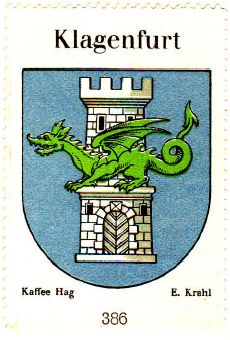Klagenfurt am Wörthersee: Difference between revisions
Knorrepoes (talk | contribs) (Created page with '{|width="100%" style="color:black; background-color:#ffffcc;" |width="15%"|50 px|left |width="70%" align="center" |'''Heraldry of the World<br>Civic heraldry…') |
Knorrepoes (talk | contribs) No edit summary |
||
| Line 10: | Line 10: | ||
District : Klagenfurt | District : Klagenfurt | ||
[[File:klagenfurt. | [[File:klagenfurt.gif|center]] | ||
'''Origin/meaning :'''<br> | '''Origin/meaning :'''<br> | ||
| Line 17: | Line 17: | ||
The dragon is derived from a local legend:<br> | The dragon is derived from a local legend:<br> | ||
A long time ago, when the Kings of Carinthia governed from Karnburg, there was a large area in their lands which was covered with woods and marshes. Not many people dared to go to this area. Many cattle and also several young virgins had disappeared in the area. The turned out to be inhabited by a dragon. To protect the lands and to observe the dragon, the King had a castle built close to the area. In addition he offered a large reward for the person who would be able to get rid of the dragon. A group of local farmers decided to take the risk. They took a big bull and put it on a chain with several hooks attached. When they entered the forest the dragon appeared and grabbed the bull. Thereby the hooks entered his flesh and wounded him. With much effort the farmers then were able to slain the wounded animal. Around the castle finally the village of Klagenfurt developed. | A long time ago, when the Kings of Carinthia governed from Karnburg, there was a large area in their lands which was covered with woods and marshes. Not many people dared to go to this area. Many cattle and also several young virgins had disappeared in the area. The turned out to be inhabited by a dragon. To protect the lands and to observe the dragon, the King had a castle built close to the area. In addition he offered a large reward for the person who would be able to get rid of the dragon. A group of local farmers decided to take the risk. They took a big bull and put it on a chain with several hooks attached. When they entered the forest the dragon appeared and grabbed the bull. Thereby the hooks entered his flesh and wounded him. With much effort the farmers then were able to slain the wounded animal. Around the castle finally the village of Klagenfurt developed. | ||
{|align="center" | |||
|align="center"|[[File:klagenfurt.hagat.jpg|center]] <br/>The arms in the [[Kaffee Hag : Die Wappen der Republik Oesterreich|Coffee Hag album]] +/- 1932 | |||
|} | |||
[[Literature]] : Image provided by Karl Palfrader (k.palfrader@aon.at), legend translated from the Klagenfurt website. | [[Literature]] : Image provided by Karl Palfrader (k.palfrader@aon.at), legend translated from the Klagenfurt website. | ||
Revision as of 12:05, 9 May 2011
| Heraldry of the World Civic heraldry of Austria - Österreichische Gemeindewappen |
KLAGENFURT
State : Kärnten
District : Klagenfurt
Origin/meaning :
The arms show a tower and a dragon (officially described as a serpent or Lindwurm).
The dragon is derived from a local legend:
A long time ago, when the Kings of Carinthia governed from Karnburg, there was a large area in their lands which was covered with woods and marshes. Not many people dared to go to this area. Many cattle and also several young virgins had disappeared in the area. The turned out to be inhabited by a dragon. To protect the lands and to observe the dragon, the King had a castle built close to the area. In addition he offered a large reward for the person who would be able to get rid of the dragon. A group of local farmers decided to take the risk. They took a big bull and put it on a chain with several hooks attached. When they entered the forest the dragon appeared and grabbed the bull. Thereby the hooks entered his flesh and wounded him. With much effort the farmers then were able to slain the wounded animal. Around the castle finally the village of Klagenfurt developed.
| The arms in the Coffee Hag album +/- 1932 |
Literature : Image provided by Karl Palfrader (k.palfrader@aon.at), legend translated from the Klagenfurt website.

